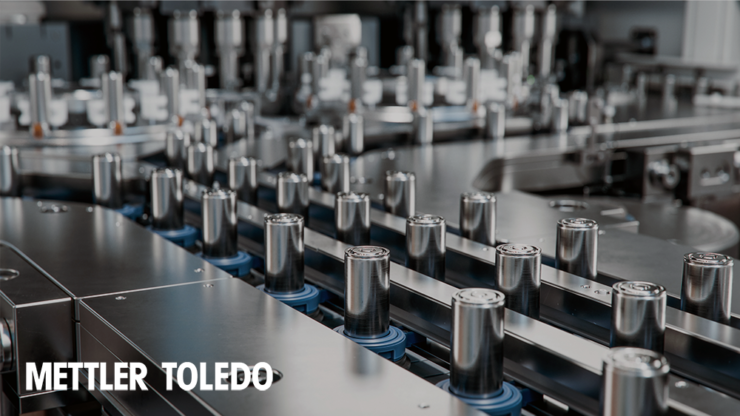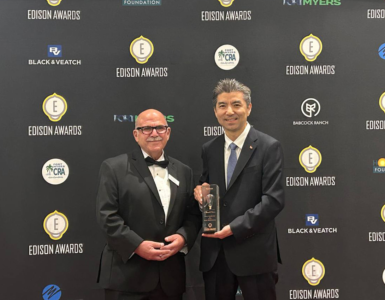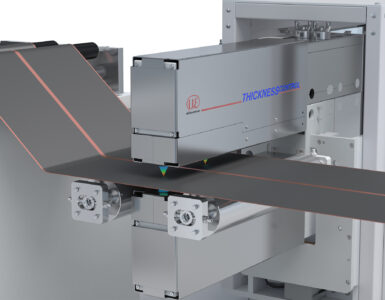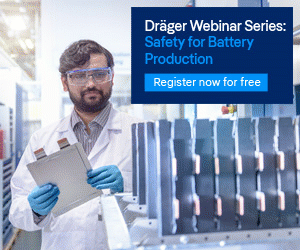From Raw Materials to Recycling: How to Optimize Battery Production
Lithium-ion batteries are essential to our daily lives, powering everything from smartphones and laptops to electric vehicles and renewable energy systems. As the demand for high-performance, reliable, and sustainable batteries grows, so does the need for efficient and accurate manufacturing processes. That’s where METTLER TOLEDO comes in.
METTLER TOLEDO is a leading provider of precision instruments, software, and services for manufacturing processes. With decades of experience and expertise in measurement science and process control, METTLER TOLEDO has developed many solutions that support battery production from raw materials to recycling.
Download the Li-ion Battery Manufacturing Brochure to discover how you can enhance the efficiency, safety, and sustainability of your lithium-ion battery manufacturing process.
🔥 What about we co-host a webinar? Let's educate, captivate, and convert the battery economy!
Batteries News is the global go-to online magazine for the battery industry, we can help you host impactful webinars that become a global reference on your topic and are an evergreen source of leads. Click here to request more details
Raw Materials
The first step in battery production is the mining and refining of raw materials such as lithium, cobalt, nickel, manganese, and graphite. Vehicle scales are crucial in the mining process, enabling accurate measurement of the weight and quantity of materials extracted from the earth and facilitating reliable data management to help you ensure efficient use of your resources.
In this first stage, materials must also be analyzed for purity, particle size, and moisture content to ensure consistent quality and performance of the final product. Weighing and analytical equipment for laboratory and processing environments can deliver accurate and reliable results for material testing. With our LabX™ software, you can streamline workflows, automate data collection, and ensure traceability.
Thermal analysis and water content by Karl Fischer titration are important for separator manufacturing because they can determine the thermal stability, purity, functional groups, and water content of separator materials.
Active Materials
Active materials for batteries consist of lithium-containing materials, electrolytes, and other ingredients that directly affect the electrochemical reaction.
Controlling particle morphology in PCAM (precursor cathode active materials) production ensures good contact between the particles and the electrolyte, which is necessary for optimal electrochemical performance. The pH of the synthesis solution and the purity of the metal ions used in the synthesis process can significantly impact particle morphology.
Both in-line and at-line pH testing are critical control parameters in ensuring the quality of PCAM active battery materials.
Electrolyte production is complex, and thousands of formulations are available to manufacturers. Lithium electrolytes are highly sensitive materials that do not transport well and age quickly when opened – losing their efficacy and taking on water quickly. Testing the electrolyte for color via UV/VIS Spectroscopy is one of the most reliable and simple methods of determining the quality of your electrolyte.
Slurry Blending and Formulation
The next step is the cathode and anode slurry blending and formulation, where active materials are dispersed in an organic solvent and stored in tanks.
High-accuracy weighing solutions can help you avoid material waste and optimize your raw material blending, inventory control, slurry mixing, electrolyte filling, and in-line quality checks. Our solutions enable consistency and traceability in every step of your workflow.
pH, conductivity, and moisture measurement solutions from METTLER TOLEDO are also essential for ensuring the quality of slurry mixtures. pH affects the viscosity and stability of the slurry, while conductivity can be used to measure the concentration of ions in the mixture. Moisture content can also affect the slurry’s performance, as it can lead to the formation of bubbles and other defects.
By carefully monitoring and controlling these parameters, manufacturers can ensure that their slurry mixtures are consistent and of high quality. This is essential for producing high-performing and safe batteries.
Electrode Manufacturing
Once the electrodes are coated, dried (if applicable), and calendared, they are ready for stacking. One critical control point remains — the residual water content in both the anode and cathode pancakes.
Measuring the water content by Karl Fischer titration is critical for several reasons. First, water can react with the cathode material to form hydroxides, which can degrade the battery’s performance and cycle life. Second, water can also lead to the formation of side reactions, which can produce gases that can cause the battery to swell or rupture. Third, water can also increase the conductivity of the electrolyte, which can render the battery inoperable.
By measuring the water content of cathodes after electrode slitting, manufacturers can ensure that they meet the required quality standards and that the batteries they produce are safe and reliable.
Electrolyte Filling
After electrode stacking, the battery cells are filled with electrolytes. High-precision weighing is the ideal solution to control electrolyte flow, ensure quality, and avoid damage due to battery instability. Additionally, many manufacturers perform product quality checks on the electrolyte, such as pH, lithium concentration, and water determination by Karl Fischer titration.
Final Product Finishing
The process of combining battery cells into modules and then modules into complete battery packs involves welding, bonding, and testing. This process requires high-resolution scales for weight-based quality control of the cell/module bonding and final battery pack. High-precision weighing technologies ensure consistency and traceability in every step of your workflow.
Recycling of Used Lithium-Ion Batteries
As the demand for lithium-ion batteries continues to grow, so does the need for efficient and sustainable recycling solutions. Innovative technologies support various steps in the battery recycling value chain, from pH and ORP monitoring while recovering raw materials and separating components to final quality control.
For manufacturers who are producing battery grade materials from recycled batteries, most of our solutions in the “Active Materials” section also apply to recycling and black mass refining and purification of the extracted mineral salts – METTLER TOLEDO helps to ensure that recycled active materials have the same high purity and performance as the first time they entered production.
Complete Value Chain Optimization
Advanced instrumentation, software, and services can help you optimize your battery value chain, from materials and components to recycling and repurposing. With our METTLER TOLEDO solutions, you can benefit from reliable and accurate measurements, real-time monitoring, and comprehensive data analysis, all while ensuring compliance with regulatory requirements.
Download the Li-ion Battery Manufacturing Brochure to discover how you can enhance the efficiency, safety, and sustainability of your lithium-ion battery manufacturing process.
About METTLER TOLEDO
METTLER TOLEDO is a leading global supplier of precision instruments and services. We are recognized as an innovation leader, and our solutions are critical in key R&D, quality control, and manufacturing processes for customers in a wide range of industries including life sciences, food, and chemicals. Our sales and service network is one of the most extensive in the industry. Our products are sold in more than 140 countries and we have a direct presence in approximately 40 countries. For more information, please visit www.mt.com.
READ the latest Batteries News shaping the battery market







